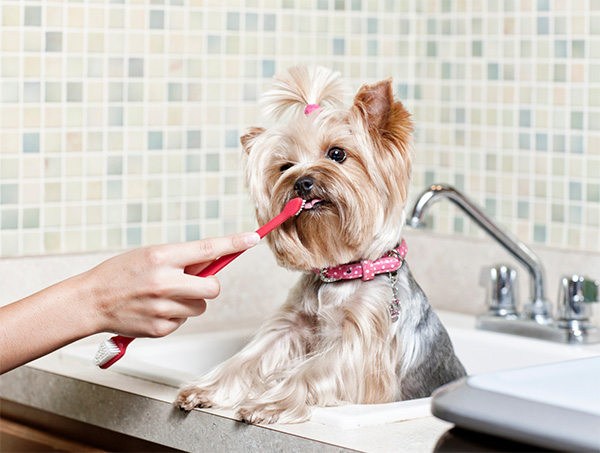Puppy teething is a normal process that starts when they are about 3 weeks old and can last until they are around 6 months old. During this time, puppies transition from their baby teeth to adult teeth, often exhibiting behaviors like excessive chewing and drooling as their new teeth emerge and their baby teeth fall out. Understanding the teething process can help owners provide the best care, ensuring their puppy's comfort and preventing destructive chewing habits.
Identifying the symptoms of teething and providing suitable chew toys can help ease this phase for both the puppy and the owner. Proper dental care is crucial to keeping the puppy's teeth healthy and supporting its growth into an adult dog. Owners can help their new puppy transition smoothly from milk teeth to strong, healthy adult teeth, ensuring a happy and well-cared-for pet by being attentive and patient.
Understanding the Teething Process
Teething is when puppies shed their baby teeth, and the puppy's adult teeth come in. This crucial developmental phase impacts their future dental health. Just like in humans, teething in puppies is marked by discomfort and the need to chew to alleviate pain and help the teeth break through the gums.
Comparing puppy teething to human teething reveals similarities, such as the discomfort and the timeline, but also differences, like the number of teeth and the stages they go through. While human babies have 20 primary teeth, puppies initially have 28 baby teeth and eventually develop 42 adult teeth.
Stages of Puppy Teething

Stage 1: Baby Teeth Eruption (3-8 Weeks)
The initial stage of puppy teething begins when their baby teeth, also known as deciduous teeth, start to emerge, typically between 3 and 8 weeks of age. During this period, puppies may experience tender gums and a strong desire to chew, which is completely normal and can be alleviated with appropriate teething toys and a balanced diet.
Symptoms of this stage include mild discomfort, increased chewing, and occasional irritability. Providing soft and safe chew toys and frozen toys can help ease the discomfort and support healthy chewing habits while ensuring the puppy's teeth are clean and healthy is essential.
Stage 2: Shedding Baby Teeth (12-16 Weeks)
Puppies begin to lose their deciduous teeth between 12 and 16 weeks of age, making way for their permanent adult teeth. This crucial stage requires close monitoring and regular vet check-ups to ensure the dog’s teeth are healthy and the puppy teeth fall out naturally.
A teething puppy may experience discomfort, and providing a chew toy can help soothe their aching mouth. As the permanent teeth begin to emerge, maintaining the dog’s teeth clean and healthy sets the foundation for their dental health as adult dogs, ensuring a smooth transition from deciduous teeth to a full set of strong, permanent teeth.
Stage 3: Growth of Adult Teeth (16-24 Weeks)

The transition from puppy teeth to adult teeth continues from 16 to 24 weeks old, with the puppy's baby teeth starting to fall out as the permanent adult teeth emerge. During this painful process, puppies may chew more aggressively to soothe their gums, making it important for pet parents to provide safe toys and monitor their dog's chewing habits.
As the puppy's teeth begin to fall out and new teeth take their place, this period can vary depending on the puppy's breed, with smaller breeds having different timelines. Getting your puppy used to having their teeth touched from a young age can help with future vet visits and ensure the dog's adult teeth remain healthy and strong.
How to Help Your Teething Puppy
Provide Chew Toys
Chew toys are a great way to help your puppy during teething. They provide relief by allowing the puppy to chew, which helps to massage the gums and facilitate the breaking through of new teeth.
When choosing chew toys, opt for those made from safe, durable materials. Avoid toys that are too hard, as they can harm the teeth. Instead, choose products made specifically for teething puppies.
Frozen Treats
Frozen treats can be very soothing for teething puppies. Cold temperatures help numb the gums and reduce inflammation, offering significant relief.
Easy recipes for frozen treats include freezing broth or water with some peanut butter, almond butter, or yogurt. However, ensure that any treats you give are safe for puppies and free from harmful ingredients like artificial sweeteners or excessive salt.
Using Teething Gels
Teething gels are another option to provide relief. These gels are designed to soothe sore gums and reduce discomfort.
When applying teething gels, it's important to adhere closely to the instructions to prevent any negative side effects. Always check with your veterinarian to confirm the product is appropriate and safe for your puppy.
Dental Care for Teething Puppies

Establishing a dental care routine early is vital for your puppy's long-term dental health. Healthy teeth and gums can be achieved by brushing regularly with toothpaste designed for puppies and offering dental chews. Brushing your puppy's teeth should be done gently and consistently. Utilize a toothbrush specifically made for dogs and gradually ease into the brushing routine to ensure it becomes a pleasant experience.
Recognizing Teething Problems
Retained Baby Teeth
Occasionally, baby teeth may not shed as expected, resulting in retained baby teeth. This issue can lead to crowding and misalignment of the permanent teeth.
If you observe that your puppy has retained baby teeth, it's important to consult your veterinarian. They may need to be extracted to prevent potential dental problems and ensure the proper development of the adult teeth.
Malocclusion and Misalignment
Malocclusion refers to the misalignment of teeth, which can occur during the teething process. This condition can cause issues with chewing and lead to broader dental health problems. This issue often arises when a puppy's baby teeth start to fall out, and the canine teeth emerge. Monitoring the puppy teething timeline is essential to catch signs of malocclusion early and ensure proper intervention.
If you think your new puppy may have malocclusion, it's crucial to consult a veterinarian for guidance. Early intervention can help correct the issue and prevent long-term problems. Proper dental care, including regular check-ups, is crucial to keep puppies' teeth healthy and ensure they develop into adult dogs without dental issues. Observing the pup's behavior and checking their mouth can help you notice problems before they become severe, ensuring a smooth transition as puppies stop teething and grow into healthy dogs.
When to Seek Veterinary Help
There are times when teething symptoms may require professional attention. Signs such as persistent pain, excessive bleeding, or indications of infection are reasons to seek advice from your veterinarian. Regular dental check-ups are essential to ensure your puppy's teeth are developing correctly and to address any potential issues early on.
